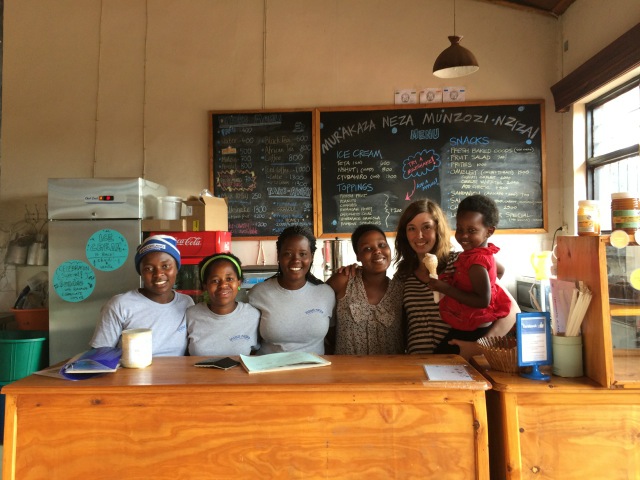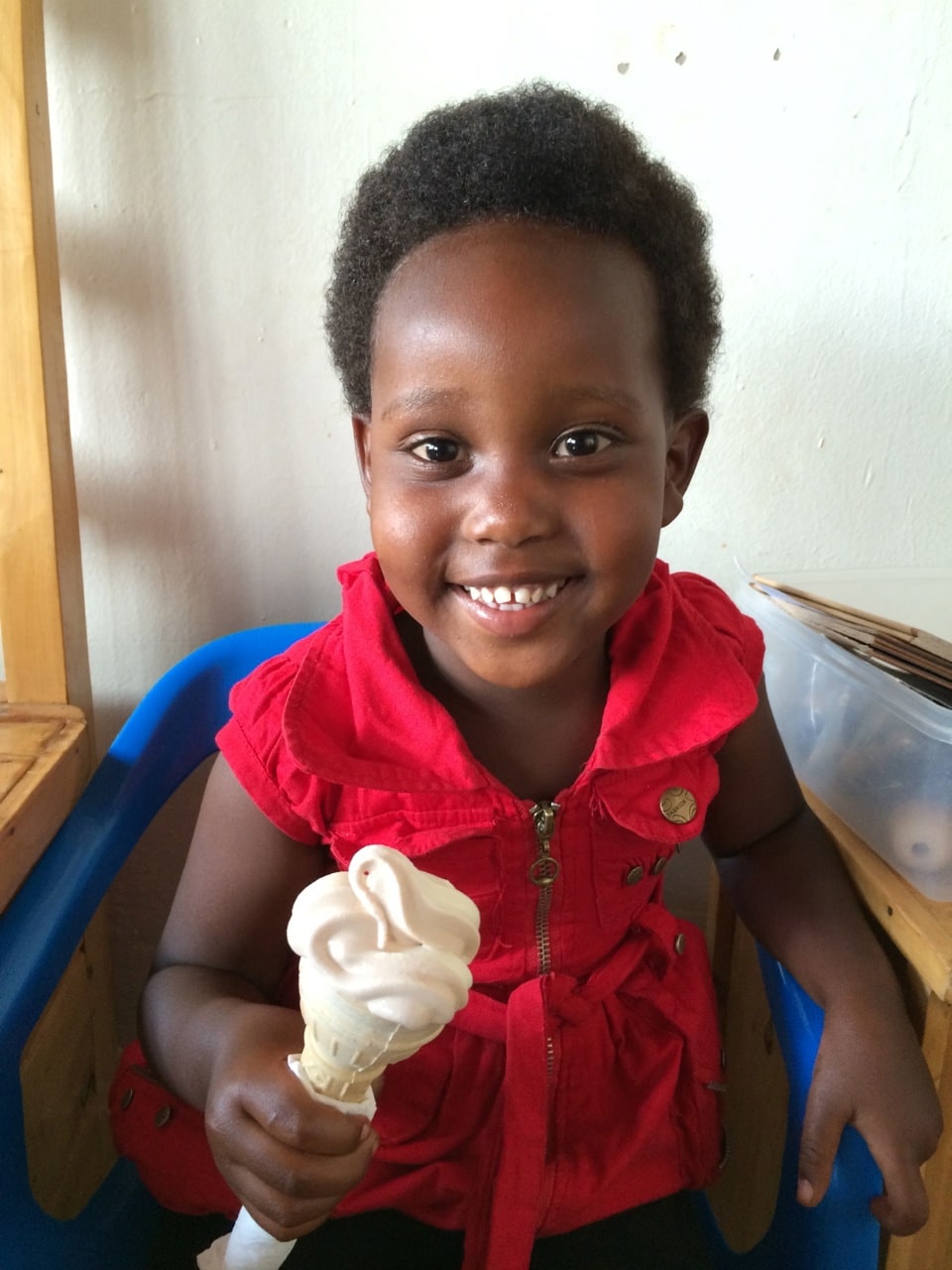
Wouldn’t it be nice if your guilty pleasure wasn’t so guilty? That’s exactly what friends Alexis Meisen and Jennie Dundas decided to create when they founded Blue Marble Ice Cream — an artisanal, organic ice cream company with a twofold goal. First, create an ice cream you can feel good about eating; second, use the company to help others do the same.
Certified Organic Product with Award-Winning Flavor
Alexis and Jennie are Brooklyn natives; when they decided to open Blue Marble in 2007, there was nowhere else they wanted to be. They found their home at Industry City in 2012, a historic industrial property that was originally built in 1895 and is currently being repurposed to bring manufacturing back to the city. And for Blue Marble, only the best manufacturing will do.
Alexis and Jennie decided early on that they wanted to create an ice cream that you could feel good about eating. The ice cream is super-premium and certified organic — the only certified organic ice cream brand native to NYC. Blue Marble’s dairy is sourced from two collectives raising pasture-raised, grass-fed cows and the mix-ins and flavorings are organic, natural, and local whenever possible, like Crown Maple Syrup for their maple ice cream, Amish honey for their lemon honey sorbet and top quality organic cookies for their cookies and cream. The ice cream is gluten-free (unless the flavor has cookie pieces in it) and are also egg and corn syrup free.
But that’s not all. Blue Marble also uses biodegradable bowls, spoons, cups and straws as well as green materials in their shops.
And people are noticing. In 2009, Blue Marble won Best New Ice Cream in the Time Out New York’s Readers Choice awards; they were also named among the best 25 ice creams in the US by Food & Wine in 2012 — a huge win for local production in New York City.
Making Blue Marble Global
That being said, the very name of Blue Marble Ice Cream — named for the infamous image of the earth taken from Apollo 17 — seemed to make it destined for greatness on a larger scale. Says Alexis, “When we chose the name “Blue Marble,” (…) we chose it because we felt it was reflective of how we wanted to conduct our business — as a responsible member of the global community.”

But how exactly does an organic ice cream company based in New York go global while still staying true to its values? For Blue Marble, the answer came in 2010, when they partnered with a group of women in Rwanda to open Sweet Dreams, the country’s first-ever local ice cream shop. According to Alexis, the opportunity came about when Kiki, a Rwandan woman, approached them about coming to her community and helping a group of women there open the shop.
“Before starting Blue Marble, I had worked for 10 years in the international development realm, so she had come to the right people,” Alexis says. And while at first, it seemed like an enormous challenge to manage both their growth in New York and the new project, it seemed impossible to say no, given what Kiki wanted to create.

“She wanted to create sustainable jobs and livelihoods for her community members (who represented both sides of the 1994 genocide), support Rwandan farmers and help boost the local economy overall, and most importantly, create a welcoming place for people to gather, connect and revive,” Alexis says.

It took two years to open Inzozi Nziza or “Sweet Dreams” in Butare — it was and remains Rwanda’s first ever ice cream shop, independently run by local women since 2012 and supported by local farmers and producers and, occasionally, by Blue Marble itself.
“From time to time, we will support the shop financially with the purchase of a large piece of equipment or another big ticket item, but all operational expenses are met through revenue,” Alexis says. “This is a remarkable feat, given how poor the surrounding community is and what little familiarity there was with ice cream when we started. It’s a testament to the power of smart women! And ice cream.”

What’s Next for Blue Marble?
While Blue Marble no longer has a stake in the Rwandan shop, the nonprofit that Alexis and Jennie created to run it is currently being used to open another shop in Haiti called Bèl Rèv — Sweet Dreams in Creole.
“This shop, like Inzozi Nziza, will be a social enterprise, meaning any and all profit derived from its activities will be funneled back into the business to enable us to grow and create more positive opportunities for more Haitians,” Alexis says. With this shop, she plans to work to expand throughout the country beyond the original location and therefore keep more of a hand in its development than she did in Rwanda. The first shop should open this summer.
In order to train future employees, they are currently working on a training program with a group from a local organization called KOFAVIV, an organization that supports victims of sexual violence. Participants in the program will learn important business-related tasks so that they will be ready to take on jobs at the new shop.
“We are even considering developing a small fleet of solar powered ice cream carts, which could serve as micro franchises, of sorts, and provide more opportunities to more women,” Alexis says. Just goes to show how far a sweet idea can go.
How You Can Get Involved
The best way to get involved with Blue Marble’s work is to use your dollar to support the cause. Every purchase of Blue Marble ice cream supports organic farmers and eco-sustainable organic dairies as well as future projects for the related nonprofit.
Shops have opened in Cobble Hill, Prospect Heights, and TriBeCa. The ice cream started being sold wholesale in 2010, so you can also ask your local supermarket to sell it.
In the summer months, the ice cream is also available via certain outdoor vendors, like the Brooklyn Flea, Smorgasburg, Brooklyn Bridge Park, Summer Stage and Governor’s Island.
Moreover, you can get it at several restaurants, including Landmarc in New York City. Pick your favorite, and take a taste.
By Emily Monaco
Also Check Out:
Wanderlust Art From The Travel Quote Collection
How A Farm-To-Fork Food Truck Is Providing A Positive Future For Formerly-Incarcerated Youth
Delicious Ways To Support The Local Economy While Traveling
Emily Monaco
Latest posts by Emily Monaco (see all)
- Top 10 Prague Pastries To Try On Your Next Czech Republic Trip - Dec 20, 2023
- Unusual Budapest: Childhood Memories & Sweet Treasures At The Marzipan Museum - Sep 8, 2016
- How The Tomato Transformed The European Diet - Jan 9, 2016
- Is Himitsu The Secret To Atlanta’s Burgeoning Cocktail Scene? - Dec 28, 2015
- The French Influence On Vietnamese Cuisine - Dec 16, 2015



